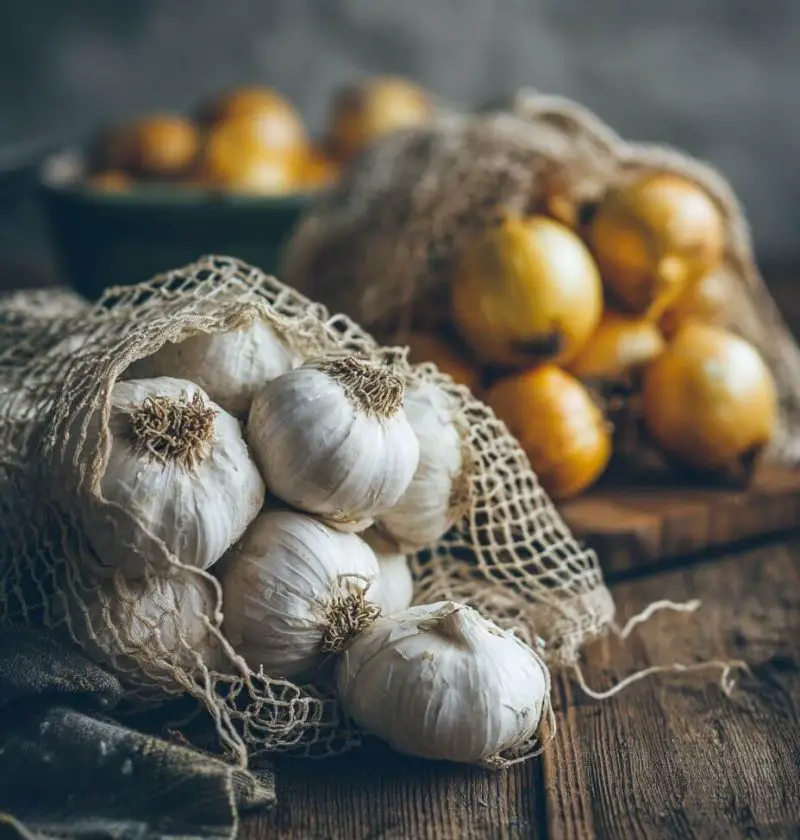Save This Recipe
You know, I used to keep my garlic and onions tucked neatly in the fridge, right next to the veggies and eggs — thinking I was doing the right thing. Turns out, that habit was silently ruining two of the most essential ingredients in my kitchen.
It all came to a head one rainy Tuesday when I pulled out a garlic bulb that had sprouted what looked like a tiny alien antenna. The onions weren’t doing much better—soft, sad, and vaguely damp. That’s when I thought: “Okay, something’s off here.”
And if you’ve ever wondered why your onions get mushy or your garlic loses its kick… honey, you’re not alone. Let’s fix it once and for all.
Why You’ll Love This Guide
-
Keeps your garlic and onions fresher, longer
-
Saves you money (no more wasted bulbs!)
-
Preserves flavor and texture beautifully
-
Helps avoid weird smells, mold, or sprouting
-
Makes your pantry look like a seasoned cook lives there (because one does!)
The Big Mistake: Sticking Them in the Fridge
Let’s just get this out of the way: your fridge is not their friend. I know, it feels like the safe zone — cool, dark, controlled. But garlic and onions aren’t into all that moisture.
Refrigeration messes with their vibe — garlic starts to sprout, onions get soggy, and both can soak up odors from nearby foods (ever had an onion that tasted like last night’s chili? Not ideal). Instead, they like it a little rustic: dry, dark, and airy — like a little cabin in the woods.
So Where Should They Go?
Think pantry, cupboard, or any spot that’s:
-
Dry (moisture is the enemy)
-
Dark (light triggers sprouting)
-
Ventilated (they need to breathe)
-
Room temperature (ideally 60–75°F / 15–24°C)
I like to keep mine in a ceramic crock with holes on the side or mesh produce bags hanging from a hook in the pantry. Even a simple paper bag tucked in a drawer works wonders.
Say No to Plastic (Seriously)
Plastic bags are a trap — literally. They trap moisture, which invites mold faster than you can say “casserole.” Instead, go for:
-
Mesh bags – let the air circulate
-
Paper bags – absorb just enough moisture and keep things dry
-
Wire baskets – great airflow and look cute on the counter
And while we’re here, avoid closed containers with no ventilation — they turn into little humid boxes. Garlic and onions hate that.
Bonus Tip: Store Them Separately
I know it’s tempting to throw all your alliums into one big bowl — garlic, onions, maybe a shallot or two — but don’t do it. Garlic and onions, while culinary soulmates, actually don’t play nice in storage.
-
Onions release moisture and gases that can make garlic spoil faster.
-
Garlic’s potent smell can seep into the onions and give them a funky, off-putting taste.
Just give them each their own little space. Think of them like siblings — close, but they still need their own rooms.
And Whatever You Do, Keep Them Away from Potatoes
Oh goodness, potatoes are troublemakers in this story. They release ethylene gas and moisture that makes onions sprout and garlic go soft. Plus, if one spoils, the rest go down like dominoes.
Store your potatoes in their own bin, across the pantry, far away from your onions and garlic. Trust me, they all last longer that way.
A Quick Word About Ethylene
If you’re wondering what on earth ethylene is — it’s a natural gas some produce emits (looking at you, apples and bananas) to speed up ripening. Onions are especially sensitive to it.
So just keep your garlic and onions away from ethylene-producing fruits — unless you’re in the mood for a sprouting party.
So What’s the Sweet Spot for Temperature & Humidity?
Here’s the Goldilocks zone:
-
Temperature: 60–75°F (15–24°C)
-
Humidity: 60–70% (just enough to prevent drying out, but not so much that mold can throw a party)
In simpler terms: keep ’em somewhere cool-ish, dry-ish, and airy. Your pantry is likely perfect already.
How Long Will They Last?
-
Whole garlic bulbs: 3–5 months
-
Individual garlic cloves: about 10 days (store peeled cloves in the fridge in a small container if you must — just use them quickly!)
-
Onions (whole): 1–2 months
-
Onions (cut): Up to 7 days in the fridge (wrapped tightly)
If they start sprouting, going mushy, or smell a little off — it’s time to say goodbye.
What About Those Internet “Hacks”?
Oh lord, don’t get me started.
-
Garlic in oil? Unless it’s refrigerated and used within a week, it can be a botulism risk. Please don’t try this without proper research.
-
Freezing onions? You can, technically. But they come out kinda limp and watery — great for soups, not much else.
Stick with good airflow, a dark spot, and separation from potatoes and fruit — your garlic and onions will thank you.
Let’s Keep It Fresh
Honestly, storing garlic and onions the right way isn’t fancy. It’s just old-school kitchen wisdom — passed down from folks who didn’t have fridges full of hummus and half-used sauces. They knew: cool, dry, dark, and separate.
And now? You know too.
If you’ve got a favorite trick or a question about storage (or heck, want to chat garlic confit), drop it in the comments below. I love hearing how other home cooks keep their pantries humming.
Stay flavorful,

